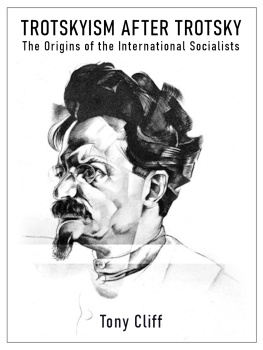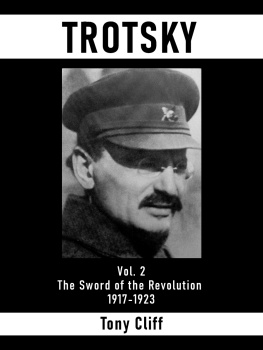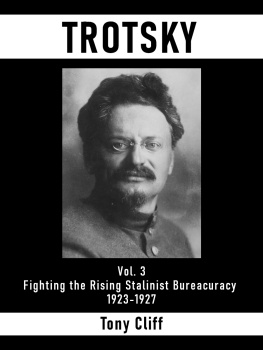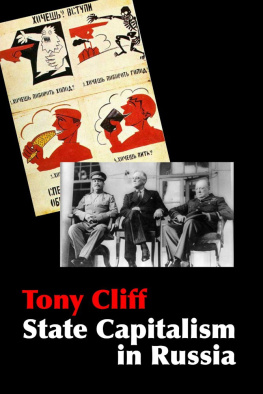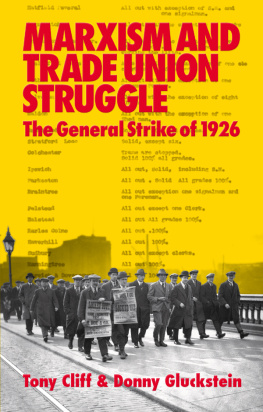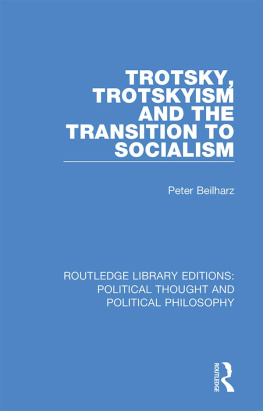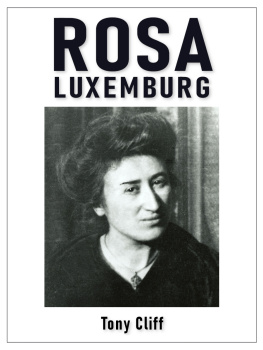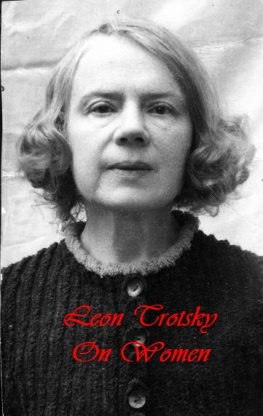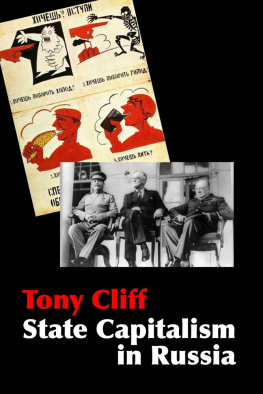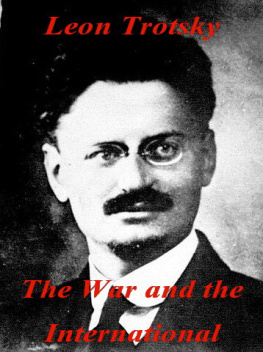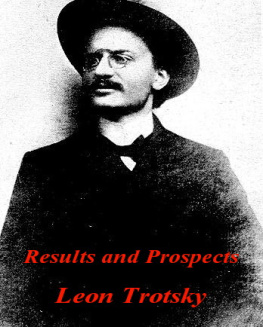Tony Cliff - Trotskyism After Trotsky: The Origins of the International Socialists
Here you can read online Tony Cliff - Trotskyism After Trotsky: The Origins of the International Socialists full text of the book (entire story) in english for free. Download pdf and epub, get meaning, cover and reviews about this ebook. year: 2020, publisher: Marxists Internet Archive, genre: Politics. Description of the work, (preface) as well as reviews are available. Best literature library LitArk.com created for fans of good reading and offers a wide selection of genres:
Romance novel
Science fiction
Adventure
Detective
Science
History
Home and family
Prose
Art
Politics
Computer
Non-fiction
Religion
Business
Children
Humor
Choose a favorite category and find really read worthwhile books. Enjoy immersion in the world of imagination, feel the emotions of the characters or learn something new for yourself, make an fascinating discovery.
- Book:Trotskyism After Trotsky: The Origins of the International Socialists
- Author:
- Publisher:Marxists Internet Archive
- Genre:
- Year:2020
- Rating:5 / 5
- Favourites:Add to favourites
- Your mark:
- 100
- 1
- 2
- 3
- 4
- 5
Trotskyism After Trotsky: The Origins of the International Socialists: summary, description and annotation
We offer to read an annotation, description, summary or preface (depends on what the author of the book "Trotskyism After Trotsky: The Origins of the International Socialists" wrote himself). If you haven't found the necessary information about the book — write in the comments, we will try to find it.
Trotskyism After Trotsky: The Origins of the International Socialists — read online for free the complete book (whole text) full work
Below is the text of the book, divided by pages. System saving the place of the last page read, allows you to conveniently read the book "Trotskyism After Trotsky: The Origins of the International Socialists" online for free, without having to search again every time where you left off. Put a bookmark, and you can go to the page where you finished reading at any time.
Font size:
Interval:
Bookmark:
The Origins of the International Socialists
Bookmarks, London, 1999
1999 Bookmarks Reproduced here with kind permission
Transcribed and marked up by Dylan Stillwood and Einde OCallaghan for the Marxists Internet Archive
Converted to ebook format June 2020
Cover image: Yuri Annenkov, Trotsky, 1922
Wikimedia Commons
At the time of ebook conversion this title was available in hardcopy from Bookmarks
https://bookmarksbookshop.co.uk/
Recognising the Problem
In The Communist Manifesto Marx and Engels argue that communists generalise from the historical and international experience of the working class. This experience is always changing and developing and therefore Marxism always changes; the moment Marxism stops changing, it is dead. Sometimes historical change happens slowly and almost imperceptibly, but sometimes the changes are radical. Consequently there are abrupt turning points in the history of Marxism.
For example, one cannot understand the breakthrough marked by the appearance of The Communist Manifesto without taking into account the background of the coming 1848 revolution.
Another turning point was the Paris Commune in 1871 which inspired Marx to write in The Civil War in France, The working class cannot take the old state machine to use it to build socialism. He argued that the working class must smash the capitalist state machine and build a new state without a police force, a standing army or a bureaucracy, a state in which all officials should be elected, instantly recallable and should get the same wages as the workers they represent. The Communist Manifesto had not mentioned any of this. Now Marx recognised the central features of a workers state. He did not reach these conclusions from studying hard in the British Museum. His understanding flowed from the actions of the Parisian workers who took power for 74 days and showed what kind of state the working class could establish.
Again, Trotskys theory of permanent revolution was a by-product of the Russian Revolution of 1905. This theory argued that in backward and underdeveloped countries the bourgeoisie, being a latecomer, was too cowardly and conservative to solve bourgeois democratic tasks, such as winning national independence and agrarian reform. These tasks could be accomplished by revolution led by the working class at the head of the peasantry. In the process of solving these issues a workers revolution would transcend the boundaries of bourgeois property norms and this would lead to the establishment of a workers state.
The idea that the bourgeoisie was counter-revolutionary and that the working class would lead the peasantry were not insights which arose automatically from Trotskys brilliant mind; they were discovered in reality in the 1905 revolution. This demonstrated in practice how the workers, not the bourgeoisie, struggled to overthrow Tsarism to exercise democratic control over society. Petrograd, at the centre of the revolution, even developed organs of a workers state workers councils, or soviets. Further developments in Marxism by figures such as Lenin and Luxemburg also grew out of historical experience such as the latters brilliant book about the mass strike, a by-product of struggles in Russia and Poland during 1905.
A new turning point occurred when Stalin attempted to wipe out the tradition of the Bolshevik Revolution. It fell to Trotsky to champion its defence. Until his murder in 1940 he did this brilliantly. However, at the end of the Second World War the Fourth International that he founded faced a new and decisive challenge how to react to a situation radically different to that envisioned by its founder. This created special difficulties because the movement had been deprived of the intellectual giant who had led it hitherto.
Before his death Trotsky had made a series of predictions. Four of these would be challenged by the reality of developments after the Second World War.
(1) He had predicted that the Stalinist regime in Russia could not survive the war. Thus, in an article on 1 February 1935, The Workers State, Thermidor and Bonapartism, Trotsky argued that Stalinism, as a form of Bonapartism, cannot long maintain itself; a sphere balanced on the point of a pyramid must invariably roll down on one side or the other; hence the inevitable collapse of the Stalinist regime would follow.
One outcome might be capitalist restoration. In the thesis War and the Fourth International (10 June 1934) Trotsky wrote that in the case of a protracted war accompanied by the passivity of the world proletariat, the internal social contradictions in the USSR not only might lead but also have to lead to a bourgeois Bonapartist counter-revolution.
On 8 July 1936 he put forward an alternative scenario:
The USSR will be able to emerge from a war without a defeat only under one condition, and that is if it is assisted by the revolution in the West or in the East. But the international revolution, the only way of saving the USSR, will at the same time be the death blow for the Soviet bureaucracy.
Whichever perspective is considered, it is clear Trotsky was convinced of the instability of the Stalinist regime, so much so that on 25 September 1939, in an article, The USSR in War, he wrote that to see the Russian regime as a stable class system would be to place ourselves in a ludicrous position because at that time it was just a few years or even a few months prior to its inglorious downfall.
The actual reality at the end of the Second World War was very different. The Stalinist regime did not collapse. As a matter of fact, after 1945 it went from strength to strength by expanding into Eastern Europe.
(2) Trotsky thought that capitalism was in terminal crisis. As a result production could not expand and, associated with this, there could be no serious social reforms or a rise in the masses living standards. In 1938, in The Death Agony of Capitalism and the Tasks of the Fourth International, Trotsky wrote that the Western world was:
in an epoch of decaying capitalism: when, in general, there can be no discussion of systematic social reforms and the raising of the masses living standards when every serious demand of the proletariat and even every serious demand of the petty bourgeoisie inevitably reaches beyond the limits of capitalist property relations and of the bourgeois state.
However, post-war world capitalism was not trapped in general stagnation and decay. Indeed, Western capitalism enjoyed a massive expansion and alongside this came a flourishing of reformism. As Mike Kidron pointed out, The system as a whole has never grown so fast for so long as since the war twice as fast between 1950 and 1964 as between 1913 and 1950, and nearly half as a fast again as during the generation before that.
In consequence the social democratic and Communist parties, far from disintegrating, emerged in the post-war period stronger in number and support than ever before. Reformism flourished on the basis of a rising standard of living.
In Britain, for example, the Attlee government represented the zenith of reformism. Formed in 1945, it was not only the first majority Labour government, it represented the high point of Labour Party history. Whatever the myths regarding the Labour government of 1945-51 there is no doubt that it was the most effective reformist Labour government of them all.
Under Attlee workers and their families fared much better than before the war. The government kept up a high level of expenditure on the social services; while food subsidies were pegged in the April 1949 budget at 465 million, they still represented a formidable sum and did much to keep down the cost of living for working people. And, of course, full employment and relatively mild inflation were immeasurable boons to workers.
Font size:
Interval:
Bookmark:
Similar books «Trotskyism After Trotsky: The Origins of the International Socialists»
Look at similar books to Trotskyism After Trotsky: The Origins of the International Socialists. We have selected literature similar in name and meaning in the hope of providing readers with more options to find new, interesting, not yet read works.
Discussion, reviews of the book Trotskyism After Trotsky: The Origins of the International Socialists and just readers' own opinions. Leave your comments, write what you think about the work, its meaning or the main characters. Specify what exactly you liked and what you didn't like, and why you think so.

